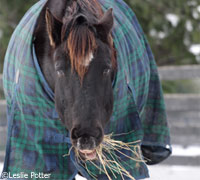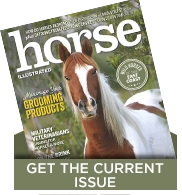 The American Youth Horse Council reminds every horse owner or caretaker that cold, wet weather brings additional considerations for the well-being of our equines.
The American Youth Horse Council reminds every horse owner or caretaker that cold, wet weather brings additional considerations for the well-being of our equines.
- Forage for Heat and Health: Digesting food is the horse’s most effective source of heat. Cold weather increases the horse’s calorie requirements; make sure to adjust quantity accordingly. And as pasture quality declines or you transition the horse to hay, consider supplementing with concentrates containing minerals and vitamins.
- Water: Horses need water year-round for healthy digestion, and that does not mean snow. Make sure your horse has ready access to water at all times.
- Teeth: Teeth in poor condition will prevent the horse from getting adequate calories and nutrition. Have teeth attended to now so the horse doesn’t have to play nutritional catch-up in the most frigid weather.
Bodily Comfort:
- Wooly coat: The horse’s own coat is designed to keep him warm. Let it grow and thicken naturally.
- Shelter: Even a luxuriant natural coat will lose insulating loft if it gets wet, and wind can strip a horse’s heat as fast as moisture. Provide shelter at all times that protects from rain, snow and wind.
- Extra Insulation: A clipped horse may need a blanket, as might older horses or those in poor health. But a wet blanket (from weather or the horse’s own sweat) is just as useless as a wet hair coat, or worse. Provide a blanket that is waterproof and breathable. Remove the blanket daily and check the horse’s coat for skin and hair condition.
Health Matters:
- Vaccinations: Check with your vet about fall vaccinations, especially for the horse still exposed to others outside his regular herd.
- Parasite Control: Maintain a regular deworming plan. After the first heavy frost, use a product that kills bot larvae.
- Hooves: Keep up with hoof care—hooves continue to growth throughout the winter. If possible, let the horse go barefoot for the winter for safer traction and to avoid snow build-up that can cause sole bruising.
Further Reading
Ten winter health care mistakes to avoid
Winter feeding tips
The American Youth Horse Council mission is to provide encouragement, communication, leadership & resources to serve and promote the youth horse industry; AYHC carries out its mission in a widespread network of academic, breed, commercial, scientific and other industry representatives who share a common interest in “connecting kids through horses.”







Good to keep in mind.
Extra hay is the best thing for colder weather, a bit of grain, corn based, also helps.